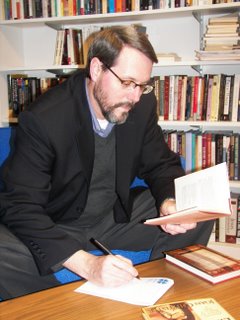Feast of St. Ambrose

Yesterday was the Feast of St. Ambrose, fourth-century Bishop of Milan. When I was studying for my doctoral comprehensive exams (the last time I was on sabbatical seven years ago), Ambrose was on a list of top ten or twenty preachers I most admired because of his ability to help his congregation reflect "mystagogically" on the meaning of their faith in a period when the church had suddenly come into prominence. In his time, he probably would have been looked to as one of the best intellectual preachers who could carefully articulate the meaning of the faith in its cultural context.
One young scholar who fell under the tutelage of Ambrose's preaching was Augustine (yes, the same guy who would become the most important Christian theologian of the first thousand years). Augustine toyed with a variety of philosophical approaches popular in his day, ranging from Manicheanism to outright dualism. Trained both as a rhetorician and a philosopher, he was hungry for someone to help him understand this new faith in the intellectual terms he so needed. To the rescue came the Bishop of Milan who was able to cut through the jargon of the day and help the young scholar to focus on the meaning of Christ and prepare him for the mystery of baptism.
In honor of Ambrose, we ate northern Italian cuisine yesterday up at the School of Theology. As I looked around the dining room at the numerous budding young scholars, I wondered which of them would extend the cause of the gospel and make their professors proud. In the end, today Ambrose is probably better known for his one convert than even for the wonderful sermons he produced. Augustine went on to pen many of the most important theological treatises, including his De Doctrina Christiana which became the singular textbook on preaching for the next thousand years. I think for many of us who teach and preach regularly, this is our one great hope--not that what we have said will be long remembered, but that one or two of our students will rise up to carry on the tradition of careful articulation of the faith in a new generation.


<< Home